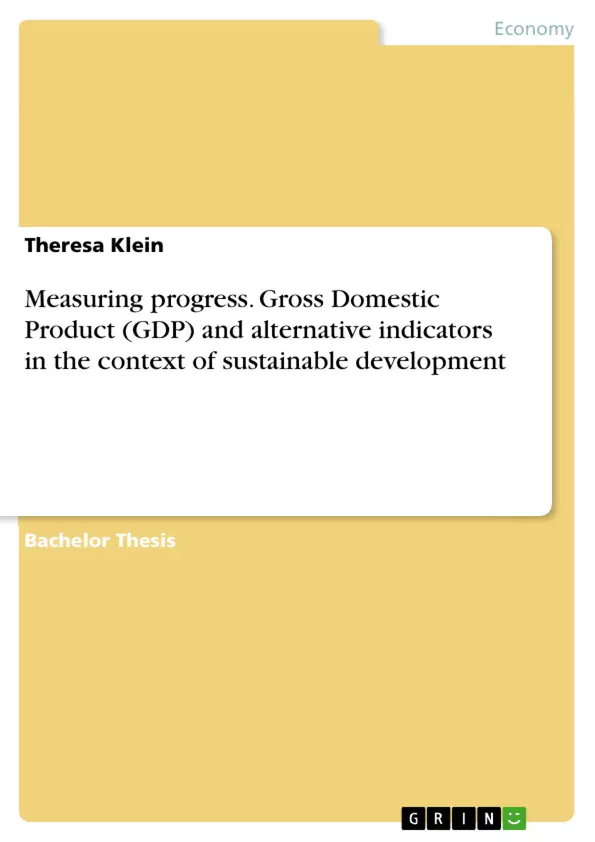Do well-known indicators really reflect what they are supposed to? Given today’s challenges regarding society, the environment and the economy, the sustainability of our economic system is questioned. GDP is currently one of the most important indicators of our economy and is considered a proxy of economic health and standard of living of a country. However, the measure poses problems in terms of the appropriate portrayal of genuine progress. This thesis aims at proposing alternative measures which represent sustainable development in an improved way over GDP. Thereby, the economic, social and ecological dimensions of sustainable development form the basis of examination. In the first place, GDP is examined for its suitability as a progress indicator. Its relevance in policy making and reasons for its persistence are worked out. Finally, alternatives which are grouped in adjusting, supplementing and replacing GDP, are presented and examined according to their coverage of the sustainable development dimensions. The examination shows that there are indeed measures which represent genuine progress in a better way. However, those indicators pose drawbacks regarding their methodology, credibility and complexity. Therefore, they cannot sufficiently replace or adjust GDP. Supplementing GDP currently appears to be the most feasible approach since it sets GDP in a more sustainable context without neglecting its benefits.
Inhaltsverzeichnis (Table of Contents)
- 1. Introduction
- 1.1 Problem description
- 1.2 Objective and methods
- 2. Sustainable development and GDP
- 2.1 Defining sustainable development
- 2.2 Defining GDP - Definition and calculation
- 2.3 Creating GDP - The development of GDP
- 2.4 Drawbacks and limitations of GDP
- 2.4.1 Economic drawbacks
- 2.4.2 Ecological and social drawbacks
- 2.5 Benefits of the GDP
- 3. Implications for policy making
- 3.1 Importance of indicators for political decisions
- 3.2 GDP affecting economic decisions and policy making
- 3.3 Barriers to change GDP
- 3.4 Political efforts towards sustainable development
- 3.4.1 Stiglitz-Sen-Fitoussi Commission
- 3.4.2 Enquete Commission "Growth, Prosperity, Quality of Life"
- 4. Alternatives to GDP in support of sustainable development
- 4.1 Indicators adjusting GDP
- 4.1.1 Index of Sustainable Economic Welfare (ISEW) and Genuine Progress Indicator (GPI)
- 4.1.2 Green GDP
- 4.2 Indicator sets supplementing GDP
- 4.2.1 Green satellite accounts
- 4.2.2 Sustainable Development Goals (SDG)
- 4.3 Indicators replacing GDP
- 4.3.1 Human Development Index (HDI)
- 4.3.2 Ecological Footprint (EF)
- 4.3.3 Case Study: Bhutan's Gross National Happiness (GNH)
- 4.4 Correlations between GDP and sustainability elements
- 5 Discussion
Zielsetzung und Themenschwerpunkte (Objectives and Key Themes)
This thesis examines the limitations of GDP as a measure of genuine progress in the context of sustainable development and proposes alternative indicators to better represent the economic, social, and ecological dimensions of sustainability.- The suitability of GDP as a progress indicator.
- The relevance of GDP in policy making.
- The drawbacks and limitations of GDP.
- Alternative measures of sustainable development that adjust, supplement, or replace GDP.
- The challenges and benefits associated with implementing alternative indicators.
Zusammenfassung der Kapitel (Chapter Summaries)
- Chapter 1 introduces the problem of using GDP as a measure of progress in the context of sustainable development and outlines the objectives and methods of the thesis.
- Chapter 2 defines sustainable development and GDP, exploring its history, drawbacks, benefits, and limitations in portraying genuine progress. It discusses the economic, ecological, and social aspects of sustainability in relation to GDP.
- Chapter 3 examines the implications of using GDP as a primary indicator for policy making, highlighting its influence on economic decisions and the challenges in transitioning to alternative measures. It explores the efforts of organizations like the Stiglitz-Sen-Fitoussi Commission and the Enquete Commission in promoting sustainable development.
- Chapter 4 delves into alternative indicators that can be used to assess sustainable development, categorized into those that adjust, supplement, or replace GDP. This chapter discusses various indicators such as the Index of Sustainable Economic Welfare (ISEW), Genuine Progress Indicator (GPI), Green GDP, Green Satellite Accounts, Sustainable Development Goals (SDG), Human Development Index (HDI), Ecological Footprint (EF), and Bhutan's Gross National Happiness (GNH).
Schlüsselwörter (Keywords)
The thesis focuses on key concepts like sustainable development, GDP, alternative indicators, economic, social, and ecological dimensions, policy making, and the challenges associated with transitioning to more comprehensive measures of progress. It explores diverse indicators such as ISEW, GPI, Green GDP, SDG, HDI, EF, and GNH, evaluating their strengths and weaknesses in representing sustainable development.- Quote paper
- Theresa Klein (Author), 2021, Measuring progress. Gross Domestic Product (GDP) and alternative indicators in the context of sustainable development, Munich, GRIN Verlag, https://www.grin.com/document/1032810



